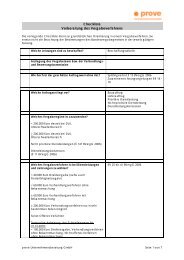DRAFT PROGRAMME
DRAFT PROGRAMME
DRAFT PROGRAMME
You also want an ePaper? Increase the reach of your titles
YUMPU automatically turns print PDFs into web optimized ePapers that Google loves.
Seminar on the Lead Partner Principle<br />
Riga, 15-16 June 2006<br />
<strong>DRAFT</strong> <strong>PROGRAMME</strong><br />
Day 1 9.00-18.00<br />
NB: Registration starts at 8.00 – coffee available<br />
The parallel workshops will be facilitated by:<br />
Group Igaunija: Riitta Ahdan, MT, and Britta Ziemann, QT<br />
9.00-9.50 INTRODUCTORY WORKSHOPS<br />
Group Amata: Lindha Feldin, QT<br />
Group Abava: Elise Blais, TB, and Mauro Novello, MT<br />
9.50-12.00 PLENARY (Lietuva) including coffee break<br />
Group Venta: Matt Nichols, QT<br />
Welcome Ieva Kalnina, Head of JTS for the two CBC priorities under the IIIB Baltic Neighbourhood<br />
Programme<br />
Presentation and discussion on: Cooperation Objective rules and regulations, including the<br />
Lead Partner Principle<br />
Key aspects of the Lead Partner Principle and the project life cycle Lindha Feldin, INTERACT<br />
Point Qualification and Transfer (QT)<br />
12.00-13.00 WORKSHOPS<br />
The Lead Partner Principle in practice – current programme and project practices<br />
13.00-14.15 Lunch<br />
14.15-15.00 PLENARY<br />
Strategic project generation – experiences and good practice in INTERREG IIIA programmes<br />
Mauro Novello, INTERACT Point Managing Transition (MT)<br />
Programme presentation on development of LP projects – TBD<br />
What characterises the development of a good Lead Partner project<br />
o Which key LP project management functions are important to advise on during project<br />
development How does your programme advise/ guide on this<br />
o What advice do you give to ensure that the project develops strong cross-border<br />
characteristics/ will fulfil the cooperation criteria<br />
o What types of activities or documentation do you use for project development guidance<br />
o Which body/ bodies are responsible for project development guidance and support How do<br />
you avoid different bodies giving conflicting advice<br />
15.00-17.20 WORKSHOPS including coffee break<br />
Lead Partner project generation and development, including project and partnership<br />
structures
Seminar on the Lead Partner Principle<br />
Riga, 15-16 June 2006<br />
<strong>DRAFT</strong> <strong>PROGRAMME</strong><br />
17.20-17.50 PLENARY<br />
Programme presentation on Lead Partner project application and assessment or LP project<br />
contracting – TBD<br />
NB: The programme presenting probably needs to choose one of the two topics as the presentation should be<br />
no more than 10 minutes<br />
On the basis of the information the programme asks for in the application, how do you assess to what<br />
extent the project:<br />
o Has been jointly developed<br />
o Will be jointly implemented<br />
o Will have a cross-border impact<br />
Contracting LP projects:<br />
o Which are the contracting procedures Who has to sign the contract from the side of the<br />
programme, apart from the project LP How long does it usually take from project approval<br />
until the subsidy contract has been signed by all relevant parties<br />
o Which information is included in the subsidy contract Particularly relevant is if the following is<br />
included and arguments for why/ why not: information on partnership members and designated<br />
LP, eligibility period for project expenditure, ERDF grant rate, reporting requirements, annual<br />
spending targets, conditions for withholding funds if spending does not meet annual targets,<br />
audit provisions both from the side of the programme and of the project and provisions for<br />
repayment of funds in case of irregularities.<br />
17.50-18.30 WORKSHOPS<br />
Lead Partner project application and assessment, selection and contracting<br />
Dinner for continued networking and exchange
Seminar on the Lead Partner Principle<br />
Riga, 15-16 June 2006<br />
<strong>DRAFT</strong> <strong>PROGRAMME</strong><br />
DAY 2 9.00-13.00<br />
9.00-10.00 WORKSHOPS<br />
Lead Partner project application and assessment, selection and contracting – continued<br />
10.00-10.50 PLENARY<br />
Handbook on the Lead Partner Principle and other INTERACT tools INTERACT Point Tool Box (TB)<br />
Programme presentation on LP project reporting – TBD<br />
Joint partnership reporting: How does the LP reporting reflect the activities and contribution of the other<br />
project partners/ the whole project partnership<br />
Joint project reporting: Is the reporting by the LP always done on activities and finances together If<br />
not: why not Advantages/ disadvantages of the two approaches.<br />
Timing of the reporting: How often is the LP required to report on project implementation How often<br />
can it make a claim for payment How long after the programme has received the claim/ project report<br />
does the LP usually receive the payment<br />
10.50-11.10 Coffee break<br />
11.10-12.40 WORKSHOPS<br />
Monitoring of Lead Partner project implementation, including monitoring activities, financial<br />
control and reporting requirements<br />
12.40-13.00 PLENARY<br />
Next steps:<br />
IIIA Network<br />
Online Forum<br />
13.00 Lunch and Depart
















